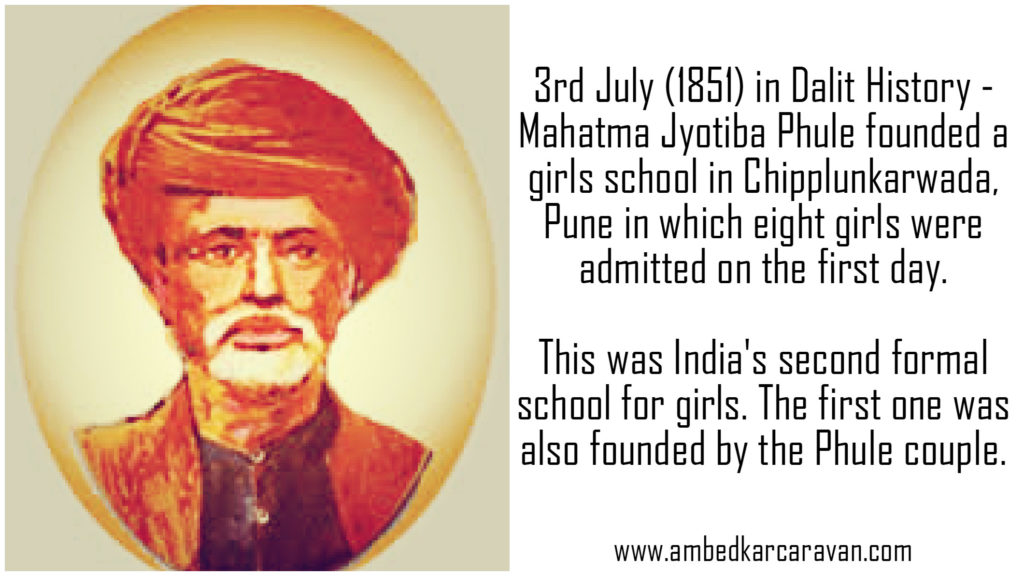
3rd July (1851) in Dalit History – Mahatma Jyotiba Phule Founded a Girls School in Chipplunkarwada, Pune
3 July 1851: Mahatma Jyotiba Phule founded a girls school in Chipplunkarwada, Pune in which eight girls were enrolled on the first day. This was India’s second formal school for girls. The first one was also founded by the Phule couple.
Today, thousands of young Indian girls study to be doctors, engineers and architects. But in the 19th century, the idea of girls being taught to read and write was scandalous.[1] Jyotiba Phule started a girls’ school in Anna Chiplunkar’s mansion at Budhwar Peth, where he taught for four hours daily without taking any salary. He set up an acting committee and handed over the management of the school to the committee, which comprised of Keshav Shivram Bhavalkar, Anna Sahastrabuddhe, Bapuraoji Mande, Vishnu Bhide, Krishnashastri Chiplunkar and Vishnushastri Pandit. Vishnushastri Pandit later became famous as the supporter of widow remarriage. The school first began with merely eight girls on the roll; soon their number rose to forty-eight. Since the financial position of the school was not very sound, Jyotirba’s wife Savitribai Phule began teaching on an honorary basis; she also became its principal.[2]
Penniless and on the street, Jyotiba, in an article published in an Ahmednagar newspaper (Dyanodaya), wrote, “I had to take up a job and Savitribai Phule went in for a teacher-training course, so the school (first school at Bhidewada in Pune) was shut down for some time. We later re-started the school in Chipplunkarwada in 1851″

3 July 1946: Sardar Vallabh Bhai Patel wrote a letter to Mavlankar (who was supposed to be elected as Chair of Consituent Assembly in framing the constitution of India after Dr. Ambedkar ceased to be the member of constituent assembly after partition) where he reiterated this position in which he noted that “everybody wants [Dr. Ambedkar] now” in the constituent assembly for framing the constitution of India.[3]
3 July 2007: Mayawati joined as member of the Uttar Pradesh Legislative Council after elected unopposed in the by-election for the upper house of the state legislature. [4]
Mayawati declared that she chose to become MLC as she wishes to concentrate on the development of all the 403 assembly constituencies of state assembly rather than my constituency only.
[1] Hemali Chhapia and Anahita Mukerji, Educating Sita article in The Times of India newspaper, 9 October 2010
[2] Tarkateertha Laxmanshastri Joshi, Translated by Daya Agarwal, Jotirao Phule essay
[3] Vallabhbhai Patel, Manibahen Patel, Sardar’s Letters, Mostly Unknown: pt.1-2. Years 1947-’48 (2 v.) book
[4] http://www.bspindia.org/kumari-mayawati.php accessed on 3 July 2013



+ There are no comments
Add yours